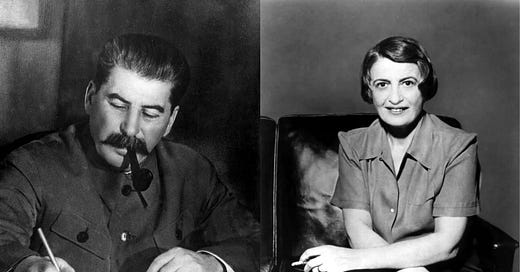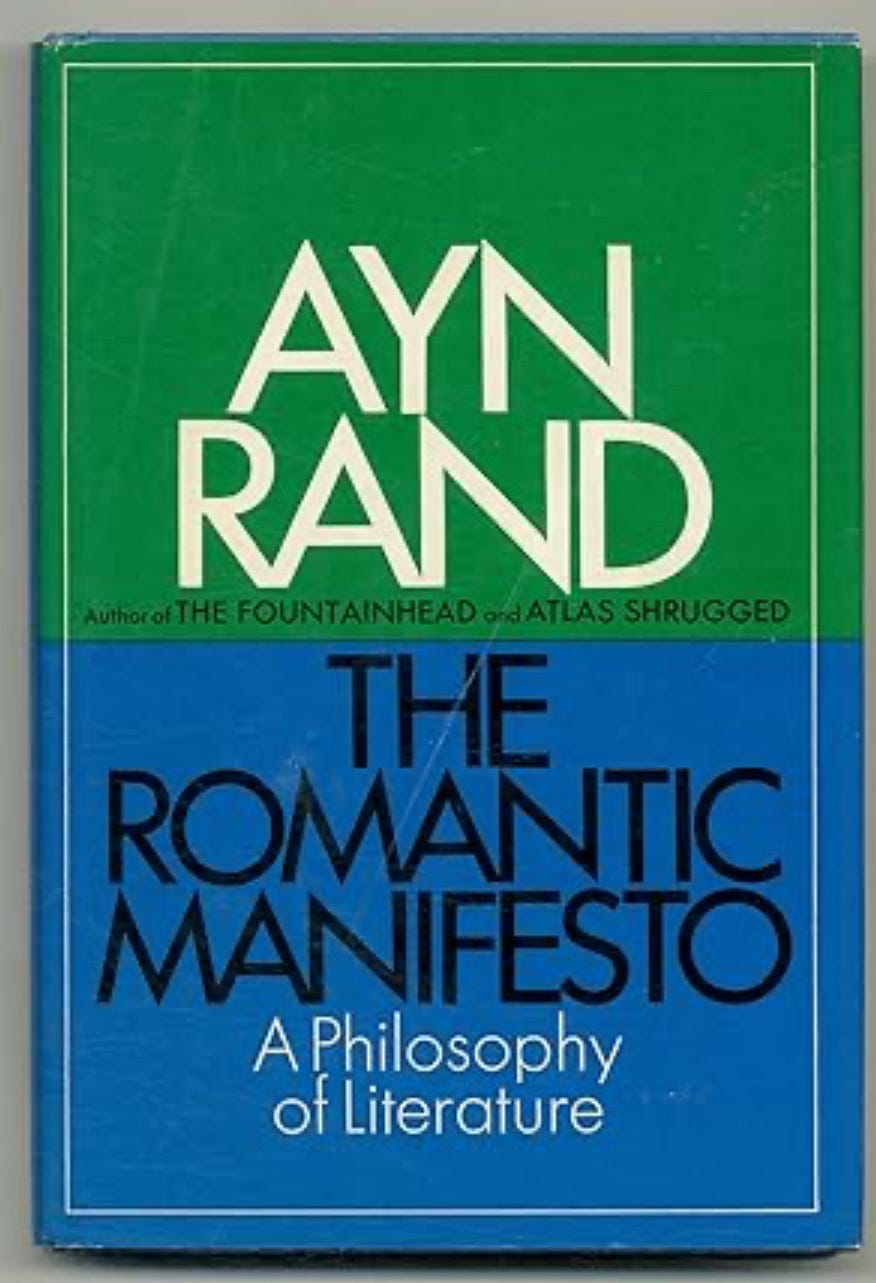Just two romantics — Ayn Rand and Joseph Stalin
Rand's Romantic Realism is the flipside of Stalin's Socialist Realism.
I recently picked up Ayn Rand’s essay collection called The Romantic Manifesto because I’ve been thinking about the emerging debate here on Substack among various Men of Letters who’ve come out as Neo-Romantics and appeal to Goethe, Shelley, Byron, and all that crowd of the 18th-19th century. They want to conjure up a fitting belief system for our crumbling Western civilization — and offer an alternative.
I’m going to offer my two cents on this turn to Romanticism a little later. For now, I want to talk briefly about my compatriot and peer: Alisa Rosenbaum, aka Ayn Rand.
She is the most successful Russian cultural export to America of the 20th century. Her books sell even more than a Bible, and she obviously outsells Vladimir Nabokov, with whose sisters she went to school back in imperial St. Petersburg. Many Americans are very taken by her intellect and philosophy — which she says is heir to Aristotle’s.
I recently met a young woman in New York whose dad was such a fan of Ayn Rand that named her Kira, after the main character of Rand’s first novel We the Living, and also forced her as a teenager to sign a contract in which she has to read Atlas Shrugged or he wouldn’t pay for her college. So, yeah, the cult following is very strong here.
As I was reading this collection of essays, something irked me — something seemed familiar about it. I mean, I never fell for Rand even when I was younger — like Masha Gessen did. Maybe it’s because Rand reminded me of the autistic, brainy Russian Jewish girls I knew in my childhood, and in fact, she is very similar to a classmate I had at a Moscow lyceum with whom I shared a desk. Her type is real and not exotic for me. But her perception by Americans is what’s fascinating to me. She definitely stood out in 1930s America, where most women were still treated like mute property, while Rand had a university degree in history from St. Petersburg University and could talk, write, and think. Her university degree, by the way, was only possible because right after the revolution, the Bolsheviks opened all universities to women, thus allowing her to attend.
“Art is the technology of the soul” — that’s what Rand writes in her essay, “The Goal of My Writing.”
What struck me about it is that it is almost a verbatim repeat of Stalin’s quote, “Writers are the engineers of the human soul” — the famous motto of socialist realism, the dominant Soviet literary ideology. I doubt that Rand plagiarized it; I do think she arrived at it all on her own.
This phrase was supposedly coined by Yuri Olesha, but it was adopted and popularized by Stalin himself. “The production of souls is more important than the production of tanks,” Stalin would say. And this stance on the importance of writers in helping engineer Soviet society explains why the vast resources that were given to the overblown “Union of Soviet Writers,” a vast cultural apparatus created under Stalin that was basically a state welfare to support writers and to promote the socialist realism that was beginning to dominate Soviet literature in the 1930s, were wasted.
Very little good writing came out of this effort. All that remained from that period of Russian literature was pretty much outside of this genre — Platonov, Olesha, Ilf and Petrov, Zoshenko, Bulgakov…1
The reason why there was so little lasting literature was because Socialist Realism is not actually realism — it’s anti-realism, anti-naturalism. It’s not Émile Zola. It doesn’t portray life as it can be observed or how it is. Rather, socialist realism portrays life as it should be under a perfect communist society. It portrays a man not as he is, but as he should be without all the bourgeois societal ills corrupting him and weighing him down.
So the man of socialist realism literature is an ideal man — just like the man of Ayn Rand’s romantic realism. Her writing has very much the same purpose — to portray an ideal man who rises above his circumstances, who is strong morally, has good ethics — it’s just that her ideal man is a capitalist and her ideal world is pre-New Deal laissez-faire capitalism. It is as schematic and as ideologically rigid and unreal as the Marxist-Leninist utopian workers’ world portrayed in socialist realism, but just inverted. The two ideals are really mirrors of each other, and it’s hard to imagine Ayn Rand as anything but a crude and simplistic reaction to the Bolshevik’s Russia that she had escaped and where her whole family was left behind.
Her philosophy then is just her personal vendetta. And it’s the most ironic thing — she calls this philosophy “Objectivism.”
Under different circumstances, it’s easy to imagine Rand as a big and celebrated socialist realist writer under Stalin, who portrays strong characters who stray true to their principles and fight for their anti-capitalist vision of the world no matter what.
Here is Rand on her philosophy of literature from “The Goal of My Writing,” an essay she published in 1963:
That which is not worth contemplating in life, is not worth re-creating in art. Misery, disease, disaster, evil, all the negatives of human existence, are proper subjects of study in life, for the purpose of understanding and correcting them—but are not proper subjects of contemplation for contemplation’s sake. In art, and in literature, these negatives are worth re-creating only in relation to some positive, as a foil, as a contrast, as a means of stressing the positive—but not as an end in themselves. The “compassionate” studies of depravity which pass for literature today are the dead end and the tombstone of Naturalism. If their perpetrators still claim the justification that these things are “true” (most of them aren’t)—the answer is that this sort of truth belongs in psychological case histories, not in literature. The picture of an infected ruptured appendix may be of great value in a medical textbook—but it does not belong in an art gallery. And an infected soul is a much more repulsive spectacle. That one should wish to enjoy the contemplation of values, of the good—of man’s greatness, intelligence, ability, virtue, heroism—is self-explanatory. It is the contemplation of the evil that requires explanation and justification; and the same goes for the contemplation of the mediocre, the undistinguished, the commonplace, the meaningless, the mindless.
And here is Rand on herself as a romantic writer against the bad “naturalism” she sees dominant in the literature of her day. I guess she is referring to the Beatniks that were popular back then. Well, Stalin wouldn’t like them either:
It is the Romantic or value-oriented vision of life that the Naturalists regard as “superficial”—and it is the vision which extends as far as the bottom of a garbage can that they regard as “profound.” It is rationality, purpose and values that they regard as naive—while sophistication, they claim, consists of discarding one’s mind, rejecting goals, renouncing values and writing four-letter words on fences and sidewalks. Scaling a mountain, they claim, is easy—but rolling in the gutter is a noteworthy achievement. Those who seek the sight of beauty and greatness are motivated by fear, they claim—they who are the embodiments of chronic terror—while it takes courage to fish in cesspools. Man’s soul—they proclaim with self-righteous pride—is a sewer. Well, they ought to know. It is a significant commentary on the present state of our culture that I have become the object of hatred, smears, denunciations, because I am famous as virtually the only novelist who has declared that her soul is not a sewer, and neither are the souls of her characters, and neither is the soul of man.
The motive and purpose of my writing can best be summed up by saying that if a dedication page were to precede the total of my work, it would read: To the glory of Man.
—Evgenia
There is an interesting essay written in 1957 on what social realism actually was in practice from Soviet dissident writer Andrei Sinyavsky, who got famously persecuted for his “anti-Soviet propaganda” — for his stories that were published in the west and for this essay as well. He was sent to gulag for seven years. It’s perhaps the best analysis of this literary phenomenon from an insider, a person who actually had to deal with socialist realism doctrine in person. Here is the English version and here is the Russian one.





"forced her as a teenager to sign a contract in which she has to read Atlas Shrugged or he wouldn’t pay for her college."
----------
Now THAT was a truly novel form of child abuse...
I've got to admit that as a college freshman, trying to fulfill elective requirements and spacing out the tougher STEM courses, I signed up for a class called "Introduction to Fiction". One of the book we were made to read was "Atlas Shrugged". In fact, that was the book the prof assigned to the class for a book report type paper, and it had an effect on my impressionable mind that lasted a while. I think mine was pretentiously titled "Metaphysics, Epistemology, Ethics, Logic, Politics and Aesthetics: Objectivism - A Complete Philosophy."
A few years later I remembered that the class was supposed to be about fiction. Ah, and the obligatory quote:
“There are two novels that can change a bookish fourteen-year old’s life: The Lord of the Rings and Atlas Shrugged. One is a childish fantasy that often engenders a lifelong obsession with its unbelievable heroes, leading to an emotionally stunted, socially crippled adulthood, unable to deal with the real world. The other, of course, involves orcs." ― John Rogers